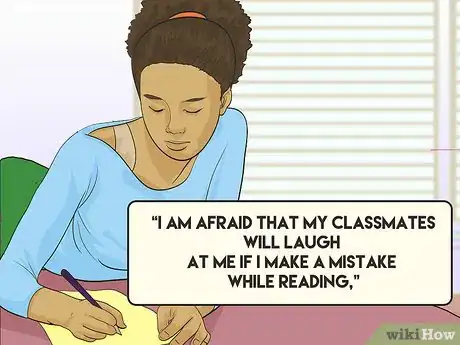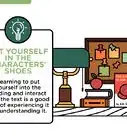This article was co-authored by Alexander Ruiz, M.Ed. and by wikiHow staff writer, Christopher M. Osborne, PhD. Alexander Ruiz is an Educational Consultant and the Educational Director of Link Educational Institute, a tutoring business based in Claremont, California that provides customizable educational plans, subject and test prep tutoring, and college application consulting. With over a decade and a half of experience in the education industry, Alexander coaches students to increase their self-awareness and emotional intelligence while achieving skills and the goal of achieving skills and higher education. He holds a BA in Psychology from Florida International University and an MA in Education from Georgia Southern University.
There are 11 references cited in this article, which can be found at the bottom of the page.
This article has been viewed 23,524 times.
Reading a good book or an entertaining article is an enjoyable, relaxing activity for many people. For others, though, the mere thought of reading can inspire anxiety and despair. A fear of reading might be expressed through anxiety over reading aloud in your classroom or at work; an inability to enjoy the act of reading; or inadequate reading skills, among other possibilities. No matter how your fear of reading manifests itself, however, recognition, practice, and help when needed can enable you to overcome it.
Steps
Reading Aloud in Front of Others
-
1Practice your reading passage as much as possible, whenever possible. Practice can’t guarantee perfection, but it will inspire greater confidence when reading in front of others. If you know what you’ll be reading ahead of time, practice in front of a mirror, in front of friends, or in front of a video camera. Practice reading slowly and clearly, as most people read aloud more quickly than they realize.[1]
- If you don’t know what you’ll be asked to read aloud, work on building your overall public reading and speaking skills. Emphasize deliberate speech and positive body language.
- Try joining an organization that focuses on public speaking, such as Toastmasters.
-
2Work on feeling and looking more calm. Many people get wobbly knees, trembling hands, and cold sweats when asked to stand up and read in front of others. You can’t deny these natural manifestations of anxiety, but you can work on recognizing and managing them.[2]
- Do calming exercises, like deep breathing or progressive muscle relaxation, before you enter the classroom or meeting room.
- Try gesturing with your hands while reading, or holding a heavier book or stack of papers in order to reduce indications of trembling.
- Practice making subtle shifts in body position and weight-bearing to limit signs of weak knees.
- If you tend to sweat a lot, wear light layers of darker clothing to mask it.
Advertisement -
3Move past mistakes. No matter how much you practice the passage and calm yourself beforehand, you’ll likely flub a line or mangle a phrase here and there. Keep going if it’s a minor error, or go back and restate the words more clearly if necessary. Accept that we all make mistakes, and remain composed. Overreacting to one mistake will likely just lead to more of them.
- If you have a crippling fear of making mistakes while reading, or simply of reading out loud in general, you may have a treatable condition such as dyslexia. Don’t hesitate to consult with a therapist and/or reading specialist.[3]
Dealing with Reader’s Block
-
1Consider what’s holding you back from reading.[4] Even if you used to be an avid reader, you might at some point find yourself unwilling or unable to pick up a book or other reading material. You may find yourself obsessing over small passages; unable to concentrate or remember what you just read; feeling inadequate to the task of reading challenging material; or even feeling insignificant in comparison to the larger world and deeper truths revealed through reading. Take some time to think about the sources and symptoms of your reading avoidance.[5]
- A fear of reading — or more accurately, an inability to draw pleasure from reading — can be known as “reader’s block,” but it also has a more technical label — lexical anhedonia.
-
2Ease back into reading. If you’ve found yourself avoiding reading, don’t try to force yourself back into the habit by picking up War and Peace or Ulysses. Start with shorter, digestible morsels of reading material, like magazine articles or short story collections.[6] Keep a wide selection of reading materials readily available, so that you can read what you want when you want.[7]
- If you want to re-read something for the eighth time, do it. If you want to read children’s books, go for it. If you want reading to become pleasurable again (or even for the first time), you need to start out by choosing reading materials that please you.
-
3Read with other people. Finding a reading buddy or joining a book club might provide you with the right mix of motivation and social interaction to get you going. Being part of a group gives you a reason to pick up the book; having others to talk with about the book helps you see that everyone has challenges, questions, concerns, opinions, and even fears about what they read.[8]
- Reading can become your gateway to developing new friendships or deepening existing relationships.
- Joining a group can also be good motivation and help to keep you accountable.
-
4Adjust your media consumption habits. If you find yourself struggling to stay awake when reading anything longer than a news article, you may have become too accustomed to consuming “rich media” — that is, interactive, brief snippets of information accessed digitally. To restore your attention span and recapture the pleasures of sitting down with a good book, you may want to dial back on your consumption of “rich media” reading materials.[9]
- For instance, at bedtime, place your smartphone out of reach and put a couple of book options on your nightstand. Limiting your exposure to a glowing screen before bed will likely help you sleep better as well.
- Many people in the western world divide their attention between multiple tasks on a regular basis, so reading something of substance or length may need to be relearned as a skill.[10]
Building Your Reading Skills
-
1Provide yourself with enough time and a good environment. Feeling rushed or uncomfortable while reading is likely to increase anxiety and reduce comprehension. Don’t leave reading a textbook chapter to the last minute, or expect to power through your book club selection the night before.[11]
- If you’re working on developing your reading skills and/or a reading habit, carry along several reading options to suit your interest in the moment and the time you have available (for instance, riding the bus or sitting in the dentist’s waiting room).
- When possible, set up in a comfy (but not sleep-inducing) space with lots of light.
-
2Prioritize reading comprehension over speed. Many people confuse reading speed with reading skill; however, not being able to remember or make sense of what you just read (because you went too fast) may contribute to a fear of reading. Let your reading speed increase naturally — or, if you desire, with targeted instruction — after you’ve built up your reading comprehension skills.[12]
- Holding a notecard or running your finger beneath the line you’re reading may slow you down a bit, but if it helps you understand what you’re reading, it’s worth the extra time.
- Try to focus on one part of the page at a time. You can make this easier by covering up part of the page with your hand or a piece of paper.
-
3Seek out reading instruction as needed. You’re never too old to learn to read, or to improve your reading skills. If reading presents a special challenge for you, seek out reading instruction resources available at your school, in your community, or online. Look for specialized instruction if you have a diagnosed condition like dyslexia.[13]
- Don’t let a diagnosis of dyslexia or another condition turn you off from reading, or make you feel like you aren’t smart enough to succeed. Many people with reading issues have gone on to achieve great things.
Overcoming Your Fears
-
1Acknowledge what you’re afraid of. The first step to overcoming your fear of reading (or anything else) is to acknowledge that the fear exists. Denial is not a cure, and you can’t will a fear out of existence.
- Verbalize your particular fear by speaking it out loud and writing it down: “I am afraid that my classmates will laugh at me if I make a mistake while reading,” or “I think trying to read this difficult book will prove how dumb I am.”
-
2Challenge your fears. Fears don’t have to be rational to be real, but examining them rationally may help you to find vulnerabilities that you can exploit. For instance, you might watch your classmates when someone else is reading aloud and notice that most of them pay no attention whatsoever, and the rest pay no mind to small reading mistakes.[14]
- Question your fears directly: “Would I really not get the promotion if I get tongue-tied once or twice while reading this report?” You can also use the “So what?” technique to trace the potential worst case scenario to a situation. For example, if you think to yourself, "I'm going to fail the reading course," then ask "So what?" “Then I won't pass my class,” and ask again "So what?" “Then I won't get the degree,” and again "So what?" Keep going until you come to the logical conclusion that your fear will not kill you and that it is not as important as it seems.
- Try gradual exposure. If you fear reading because you have trouble maintaining focus, start with short passages and quiz yourself afterward. Slowly work your way up to longer readings.
-
3Employ relaxation techniques. If you can’t eliminate the fear, reduce its impact by maintaining your calm and composure. Use deep breathing, progressive muscle relaxation, meditation, prayer, yoga, light exercise, or other activities that reduce stress. Sometimes simply talking to a trusted friend is enough to calm you down.[15]
-
4Get help managing your fears. There are no “bonus points” awarded for overcoming a fear alone; if you would benefit from help, seek it out. Seek comfort and understanding from friends and loved ones, look for support groups, or utilize the services of a therapist or counselor.
- You might feel ashamed to admit to a fear of reading, but the only shame would be to let a manageable fear prevent you from experiencing the joys and benefits of reading.
Expert Q&A
-
QuestionHow can I encourage someone to read when they hate reading?
 Alexander Ruiz, M.Ed.Alexander Ruiz is an Educational Consultant and the Educational Director of Link Educational Institute, a tutoring business based in Claremont, California that provides customizable educational plans, subject and test prep tutoring, and college application consulting. With over a decade and a half of experience in the education industry, Alexander coaches students to increase their self-awareness and emotional intelligence while achieving skills and the goal of achieving skills and higher education. He holds a BA in Psychology from Florida International University and an MA in Education from Georgia Southern University.
Alexander Ruiz, M.Ed.Alexander Ruiz is an Educational Consultant and the Educational Director of Link Educational Institute, a tutoring business based in Claremont, California that provides customizable educational plans, subject and test prep tutoring, and college application consulting. With over a decade and a half of experience in the education industry, Alexander coaches students to increase their self-awareness and emotional intelligence while achieving skills and the goal of achieving skills and higher education. He holds a BA in Psychology from Florida International University and an MA in Education from Georgia Southern University.
Educational Consultant I recommend starting with an audiobook, and from there, adding on reading the actual book to follow along. Eventually, they will hopefully be able to enjoy the actual book on its own.
I recommend starting with an audiobook, and from there, adding on reading the actual book to follow along. Eventually, they will hopefully be able to enjoy the actual book on its own.
References
- ↑ https://www.americanexpress.com/us/small-business/openforum/articles/easiest-ways-to-manage-your-public-speaking-fear-2/
- ↑ http://maryrobinettekowal.com/journal/reading-aloud-dealing-with-stage-fright/
- ↑ http://www.readingrockets.org/article/clues-dyslexia-second-grade
- ↑ Alexander Ruiz, M.Ed.. Educational Consultant. Expert Interview. 18 June 2020.
- ↑ http://www.nytimes.com/1992/05/18/opinion/fear-of-reading.html
- ↑ Alexander Ruiz, M.Ed.. Educational Consultant. Expert Interview. 18 June 2020.
- ↑ http://www.nytimes.com/1992/05/18/opinion/fear-of-reading.html
- ↑ http://www.nytimes.com/1992/05/18/opinion/fear-of-reading.html
- ↑ http://www.nytimes.com/1992/05/18/opinion/fear-of-reading.html
- ↑ http://psycnet.apa.org/journals/xlm/26/2/336/
- ↑ http://www.publishersweekly.com/pw/by-topic/industry-news/tip-sheet/article/66287-how-to-become-a-better-reader-in-10-steps.html
- ↑ http://wonderopolis.org/wonder/how-can-you-become-a-better-reader
- ↑ http://dyslexia.yale.edu/DYS_BetterReader.html
- ↑ https://www.adaa.org/understanding-anxiety/specific-phobias/treatment
- ↑ https://www.helpguide.org/articles/anxiety/phobias-and-fears.htm








































































